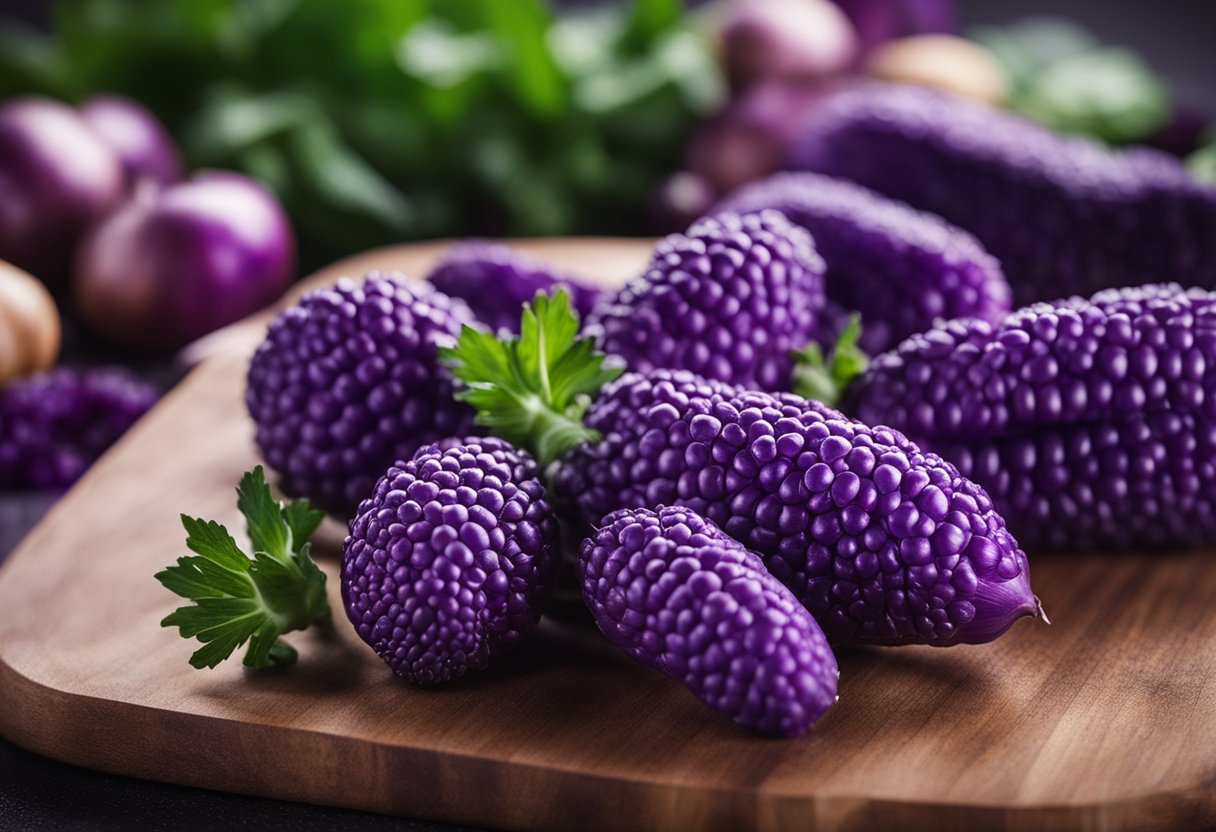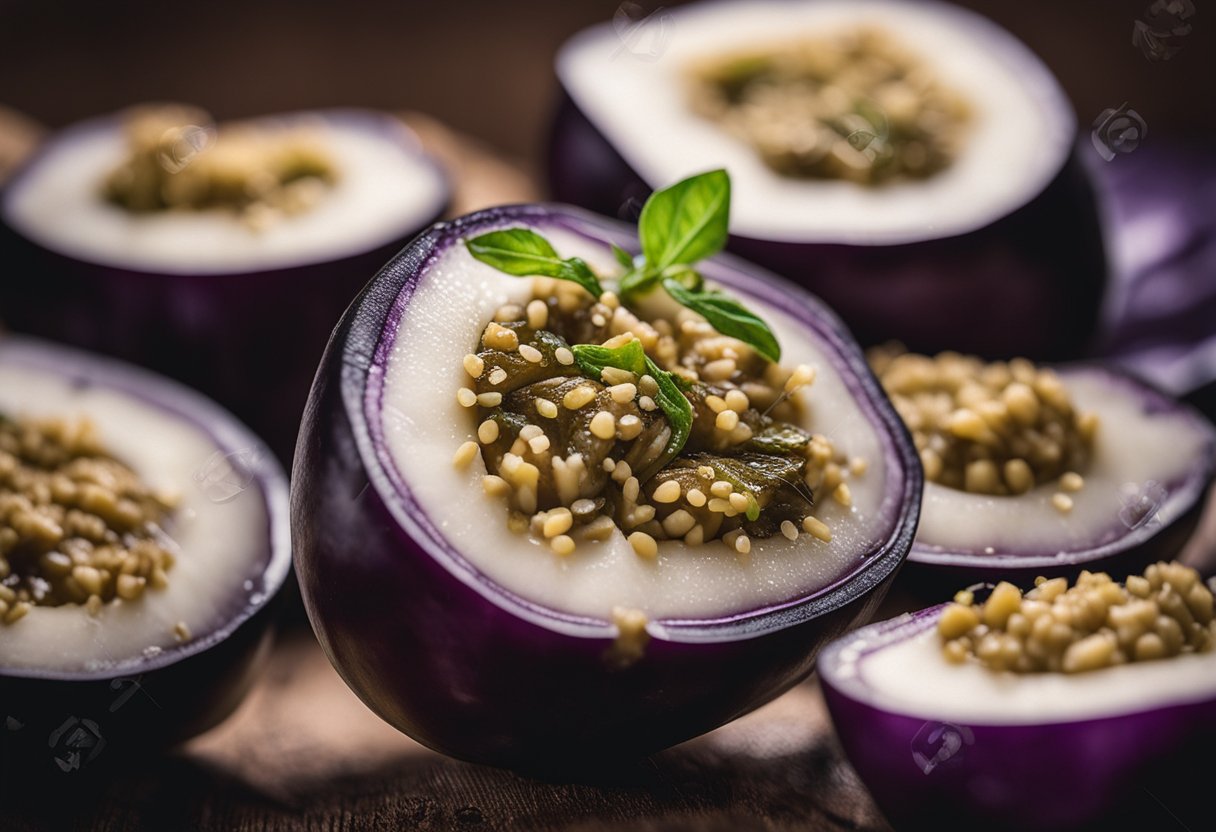As a professional chef, I am often asked about the taste of eggplant. Eggplant is a versatile vegetable that is used in many cuisines around the world. It has a unique taste that is difficult to describe to someone who has never tried it before.
In this article, I will explain what eggplant tastes like, how it is used in different dishes, and some tips for choosing and storing eggplants.

Eggplant is a member of the nightshade family, and it comes in a variety of shapes, sizes, and colors. The most common variety is the large, oblong-shaped fruit with a deep purple skin. When cooked, eggplant has a mild, slightly sweet flavor with a hint of bitterness.
The flesh is creamy white in color and contains small, black seeds. Eggplant can be prepared in many different ways, including grilling, roasting, sautéing, and frying.
Its versatility makes it a popular ingredient in many cuisines, including Mediterranean, Middle Eastern, and Asian.
Key Takeaways
- Eggplant has a mild, slightly sweet flavor with a hint of bitterness.
- It is a versatile vegetable that is used in many cuisines around the world.
- Eggplant can be prepared in many different ways, including grilling, roasting, sautéing, and frying.
What is an Eggplant

As a culinary enthusiast, I have come across the eggplant in many dishes, and I have always been curious about its taste and origin. Eggplants belong to the nightshade family and are known for their unique taste and texture. They are a popular vegetable used in many cuisines around the world.
Eggplants come in different shapes and sizes, and they can be round, oval, or elongated. They are usually heavy and have a smooth, shiny skin that ranges from deep purple to glossy white, depending on the variety. Some eggplants have green skin, but these are less common.
The eggplant is a versatile vegetable that can be cooked in many ways, including grilling, roasting, frying, and baking. It is often used as a meat substitute in vegetarian dishes because of its meaty texture.
Overall, eggplants are a great addition to any meal, and their unique taste and texture make them a favorite among many people.
Origins and Varieties of Eggplant
Eggplant, also known as aubergine, is a fruit that belongs to the nightshade family. It originated in either Africa or India but has been cultivated in eastern and southern Asia, as far back as prehistoric times. Many people believe that back then, the eggplant had the color and shape of an egg, hence the name.
Today, eggplant is a popular ingredient in many cuisines around the world. There are many varieties of eggplants, and they come in different shapes, sizes, and colors. Some of the most common varieties include the classic globe eggplant, the elongated Japanese eggplant, and the small and tender Italian eggplant.
The globe eggplant, also known as the American eggplant, is the most common variety in the United States. It is large and round, with a dark purple skin and white flesh. It has a mild flavor and a spongy texture, which makes it ideal for grilling, roasting, or frying.
The Japanese eggplant, also known as the Chinese eggplant, is long and slender, with a dark purple skin and white flesh. It has a slightly sweeter flavor than the globe eggplant and a firmer texture, which makes it ideal for stir-frying or grilling.
The Italian eggplant, also known as the white eggplant, is small and tender, with a delicate flavor and a thin skin. It is popular in Italian cuisine, where it is often used in dishes such as eggplant parmesan or caponata.
In addition to these common varieties, there are many other types of eggplants that are popular in different parts of the world. For example, the Indian eggplant is small and round, with a green or purple skin and a slightly bitter flavor. It is often used in curries and other spicy dishes.
Overall, eggplant is a versatile and flavorful ingredient that can be used in a wide variety of dishes. Whether you prefer the classic globe eggplant or the tender Italian eggplant, there is a variety of eggplant that is sure to suit your tastes and preferences.
Understanding Eggplant Taste and Texture
As a chef, I have worked with eggplants in many dishes, and I can confidently say that eggplant has a unique taste and texture that is hard to describe. Eggplant taste can be mild, slightly sweet, and creamy, with a slightly bitter aftertaste. The flavor can also vary depending on how it is cooked.
When raw, eggplant has a spongy texture and a bland, bitter taste. However, when cooked, the texture becomes tender and creamy, and the flavor becomes more pronounced and enjoyable.
Eggplant is a versatile vegetable that can be used in many different cuisines and dishes, from Italian eggplant parmesan to Indian baingan bharta.
The eggplant’s skin has a slightly bitter flavor that becomes increasingly bitter as the fruit ages. Eggplants have a thin skin that ranges from deep purple to glossy white depending on the variety.
The skin is rich in antioxidants and usually is edible unless you are dealing with overmatured eggplants which tend to have a bitter skin.
Eggplants are best when they are ripe, which means that they are firm, shiny, and heavy for their size. Overripe eggplants tend to have a bitter taste and a spongy texture. When selecting eggplants, look for ones that have a green stem, which indicates that they are fresh.
In conclusion, eggplant taste and texture can be hard to describe, but it is a unique vegetable that is worth trying. When cooked properly, eggplant can be tender, creamy, and delicious.
Remember to choose ripe eggplants with a firm texture and avoid overripe ones that have a spongy texture and a bitter taste.
The Role of Ripeness and Age in Taste
When it comes to the taste of eggplants, the ripeness and age of the fruit play a significant role. As eggplants ripen, their taste changes, and they become sweeter and less bitter.
Ripe eggplants have a smooth, glossy skin with a deep purple color. They are also heavy and firm to the touch. When cooked, ripe eggplants have a creamy texture and a slightly sweet flavor. They are perfect for grilling, roasting, or frying.
On the other hand, unripe eggplants have a bitter taste and a spongy texture. They also have a lighter color and a tougher skin. When selecting eggplants, it is important to choose fruits that are fully ripe to ensure the best flavor.
The age of the eggplant also affects its taste. Younger eggplants have a milder flavor and a softer texture. They are perfect for using in salads or as a topping for pizza.
As eggplants age, they become more bitter and develop a tougher texture. They are best used in stews or curries where they can absorb the flavors of the other ingredients.
In summary, the ripeness and age of eggplants play a crucial role in determining their taste. Ripe eggplants have a sweeter flavor and creamier texture, while unripe eggplants are bitter and spongy.
Younger eggplants have a milder flavor and softer texture, while older eggplants are more bitter and tougher. When selecting eggplants, it is important to choose fruits that are fully ripe for the best flavor.
How Cooking Methods Affect Eggplant Taste

As mentioned earlier, raw eggplants have a mildly bitter taste. However, once cooked, the taste of eggplant can be easily altered.
This is because the fruit can absorb oils and flavors from other ingredients due to its spongy, absorbent flesh. In this section, I will discuss how various cooking methods affect the taste of eggplant.
Frying
Frying eggplant is a popular way to cook it. When eggplant is fried, it absorbs a lot of oil, which can make it quite greasy. However, frying can also make eggplant taste deliciously crispy and flavorful.
To fry eggplant, slice it into rounds or cubes, coat it in flour or breadcrumbs, and fry it in hot oil until golden brown.
Grilling
Grilling eggplant is another popular cooking method. When eggplant is grilled, it takes on a smoky flavor that is quite different from other cooking methods. To grill eggplant, slice it into rounds or lengthwise, brush it with oil, and grill it until it is tender and slightly charred.
Baking and Roasting
Baking or roasting eggplant is a healthier way to cook it because it doesn’t require as much oil. When eggplant is baked or roasted, it becomes soft and creamy, and its natural sweetness is enhanced.
To bake or roast eggplant, slice it into rounds or lengthwise, brush it with oil, and bake it in the oven until it is tender.
Other Cooking Methods
Other cooking methods that can be used to cook eggplant include steaming and sautéing. Steaming eggplant is a good option if you want to preserve its natural flavor, while sautéing is a good option if you want to add other flavors to it.
In conclusion, how you cook eggplant can greatly affect its taste. Frying can make it crispy and flavorful, grilling can give it a smoky flavor, and baking or roasting can enhance its natural sweetness. Experiment with different cooking methods to find the one that you like best.
Eggplant in Different Dishes
I love using eggplant in different dishes because of its versatility and mild flavor. It can be added to stews, soups, pasta, and even used as a meat substitute in vegetarian dishes. Here are a few ways to incorporate eggplant into your meals:
Eggplant Parmesan
Eggplant Parmesan is a classic Italian dish that is loved by many. It consists of breaded and fried eggplant slices that are layered with tomato sauce, mozzarella cheese, and Parmesan cheese.
The dish is then baked until the cheese is melted and bubbly. The eggplant adds a meaty texture to the dish, making it a great vegetarian alternative to traditional chicken or veal Parmesan.
Baba Ghanoush
Baba Ghanoush is a Middle Eastern dip made from roasted eggplant, tahini, garlic, lemon juice, and olive oil. The eggplant gives the dip a creamy texture and a slightly smoky flavor. It is usually served with pita bread or vegetables for dipping.
Eggplant Soup
Eggplant soup is a hearty and comforting dish that is perfect for chilly days. It can be made with chicken or vegetable broth, and can be flavored with garlic, onions, tomatoes, and herbs. The eggplant adds a velvety texture to the soup, making it a filling and satisfying meal.
Eggplant Stew
Eggplant stew is a delicious and healthy dish that can be made with a variety of ingredients. It can be made with beef, lamb, or chicken, or can be made vegetarian with chickpeas or lentils. The eggplant adds a meaty texture to the stew, making it a filling and satisfying meal.
Pasta with Eggplant
Pasta with eggplant is a simple and delicious dish that can be made with just a few ingredients. The eggplant is diced and sautéed with garlic and olive oil, and then tossed with cooked pasta and Parmesan cheese. The eggplant adds a creamy texture to the pasta, making it a satisfying and flavorful meal.
Overall, eggplant is a versatile ingredient that can be used in a variety of dishes. It has a mild flavor that can be enhanced with different spices and herbs, making it a great addition to any meal.
Combining Eggplant with Other Ingredients

When it comes to cooking with eggplant, there are endless possibilities for combining it with other ingredients to create delicious and flavorful dishes. Eggplant is a versatile vegetable that can be used in a variety of cuisines, from Italian to Middle Eastern to Asian.
One classic combination is eggplant and tomato, which can be used to create dishes like ratatouille or caponata. The acidity of the tomatoes helps to balance out the slightly bitter flavor of the eggplant, while salt and herbs like basil or oregano can add depth and complexity to the dish.
Another great option is to combine eggplant with other vegetables like zucchini, peppers, or potatoes. These vegetables have similar textures and can be cooked together to create a hearty and satisfying dish.
Adding garlic and herbs like rosemary or thyme can help to enhance the flavors of the vegetables and create a delicious and aromatic dish.
Mushrooms are another ingredient that pairs well with eggplant. Both have a meaty texture and can be used to create vegetarian or vegan versions of classic meat dishes like lasagna or moussaka. Adding spices like cumin or coriander can help to add depth and complexity to the dish.
Finally, oils like olive oil or sesame oil can be used to add richness and depth to dishes featuring eggplant. These oils can be used to sauté the eggplant, or added to dressings or marinades to enhance the flavors of the dish.
Overall, eggplant is a versatile and flavorful vegetable that can be combined with a wide range of ingredients to create delicious and satisfying dishes.
Health Benefits and Nutritional Value of Eggplant
As a nutrient-dense food, eggplant provides a variety of vitamins, minerals, and fiber in few calories. One cup (82 grams) of raw eggplant contains 20 calories, 0.8g of protein, 4.8g of carbohydrates, and 0.1g of fat.
Eggplant is a good source of dietary fiber, which can help promote digestive health and keep you feeling full for longer periods of time.
It is also rich in potassium, a mineral that helps regulate blood pressure and support heart health. One cup of eggplant provides 188mg of potassium, which is about 5% of the daily recommended intake.
In addition to fiber and potassium, eggplant contains a variety of other vitamins and minerals, such as vitamin C, vitamin K, folate, and magnesium. These nutrients are essential for maintaining overall health and wellness.
Eggplant also contains antioxidants, such as chlorogenic acid, which may help protect against cellular damage and reduce the risk of chronic diseases. For example, a 2014 study in rodents indicated that chlorogenic acid may decrease levels of “bad” cholesterol and reduce the risk of heart disease.
Overall, eggplant is a healthy addition to any diet. It is low in calories, high in fiber, and rich in essential vitamins and minerals. By incorporating more eggplant into your meals, you can enjoy a variety of health benefits and support your overall well-being.
Choosing and Storing Eggplants
When it comes to choosing eggplants, there are a few things to keep in mind. First, look for eggplants that are firm and heavy for their size. Avoid ones that are wrinkled or have soft spots.
The skin should be smooth, shiny, and free of blemishes. Eggplants come in different colors, from deep purple to white, but the color doesn’t affect the taste.
The shape of eggplants can vary as well. Some are long and thin, while others are more round. The shape doesn’t matter as much as the firmness and weight.
Eggplants have small edible seeds that are usually not noticeable. However, larger varieties may have bitter seeds that you’ll want to remove before cooking.
If you’re concerned about the texture of eggplants, choose smaller, younger ones. They tend to be less rough and bitter than larger ones.
When it comes to storing eggplants, they are best kept at room temperature. If you plan on using them within a few days, you can store them on the countertop. Keep them away from ethylene-producing fruits and vegetables like bananas and melons.
If you need to store eggplants for longer, you can refrigerate them. Place them in a plastic bag or wrap them in plastic wrap before putting them in the fridge. They will keep for up to a week.
If you’re buying eggplants from the grocery store, make sure to inspect them carefully before purchasing. Look for ones that are firm, heavy, and free of blemishes.
Lastly, it’s worth noting that eggplants are often compared to summer squash in terms of taste and texture. They can be a bit bland on their own, but they absorb flavors well and can be a great addition to many dishes.
Frequently Asked Questions

What is the nutritional value of eggplant?
Eggplant is low in calories and high in fiber, making it a great addition to a healthy diet. It is also a good source of vitamins and minerals, including vitamin C, vitamin K, vitamin B6, folate, and potassium. Additionally, eggplant contains antioxidants that can help protect against certain diseases.
How can I cook eggplant to make it taste good?
Eggplant has a mild, slightly bitter flavor that can be enhanced with the right cooking techniques and seasonings. One popular method is to slice the eggplant and roast it in the oven with olive oil, salt, and pepper. You can also grill, sauté, or fry eggplant to add flavor and texture.
What are some popular eggplant dishes?
Eggplant is a versatile vegetable that can be used in a variety of dishes. Some popular eggplant dishes include eggplant parmesan, moussaka, baba ghanoush, and ratatouille.
Can eggplant be used as a meat substitute?
While eggplant cannot replace meat in terms of protein content, it can be used as a meat substitute in certain dishes. For example, eggplant can be used as a substitute for ground beef in vegetarian lasagna or as a substitute for chicken in eggplant curry.
What are some health benefits of eating eggplant?
Eggplant contains antioxidants that can help protect against certain diseases, including heart disease and cancer. Additionally, the fiber in eggplant can help improve digestion and promote feelings of fullness, which can aid in weight management.
What are some common misconceptions about eggplant?
One common misconception about eggplant is that it is a nightshade vegetable and should be avoided by those with inflammatory conditions. However, there is no scientific evidence to support this claim. Another misconception is that eggplant is a vegetable, when in fact it is a fruit.







